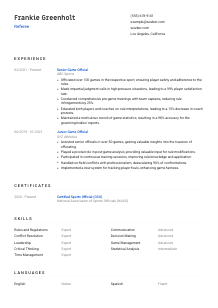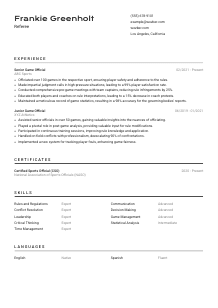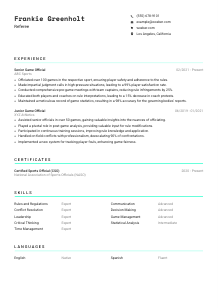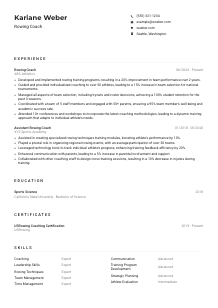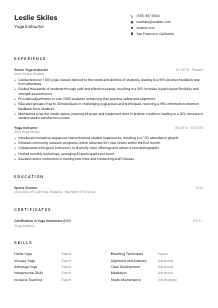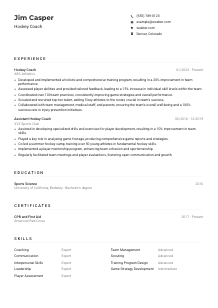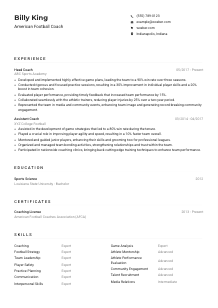Referee Resume Example
Playing defense on the pitch but feeling offensive on your resume? Dive into this Referee resume example, crafted using Wozber free resume builder. See how you can blow the whistle on your officiating skills to match any job's playing field, ensuring your career always stays fair and foul-proof!
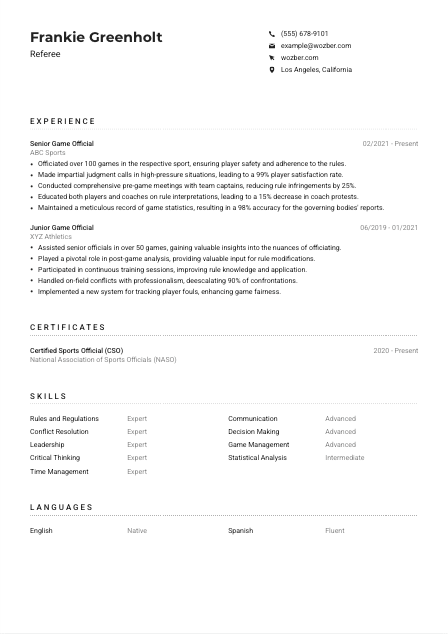
How to write a Referee resume?
Welcome, aspiring Referee! In the tough and competitive realm of sports officiating, every call matters – and so does every detail of your resume. It's time to transform your resume from a simple document to a powerful career tool that scores high with hiring managers and sails through Applicant Tracking Systems (ATS) with ease. Using Wozber's free resume builder, you're about to learn how to create an ATS-compliant resume, perfectly tailored to the job you're aiming for.
Ready to land that Referee position? Let's get into the game!
Personal Details
Your personal details section is where the game starts. It's your opportunity to introduce yourself to the coaching team (a.k.a. hiring managers) and make them want you on their team. Here's how to kick off right:
1. Lead with Your Name
Your name is your headline, so make it noticeable. Use a bold, clean font. This isn't just about aesthetics; it's about making a strong first impression.
2. Play Your Position
"Referee" – seeing this role right beneath your name instantly connects your identity with the position. It's like wearing your team's jersey; it makes you part of the game.
3. Provide the Right Signals
Make your contact information clear and mistake-free. A professional email and a current phone number are your basic equipment. Ensure they are ready and reliable.
4. Home Field Advantage
Mentioning "Los Angeles, California" not only aligns with the job's geographical requirements but also highlights your readiness to step onto the field without any delay.
5. Online Profile – Your Professional Game Tape
If you have a LinkedIn profile, include it. Think of your LinkedIn as your highlight reel – it should complement your resume and show your career highlights and professionalism.
Takeaway
By personalizing your contact details, you make it easy for hiring managers to see you as a prime candidate. This section is your warm-up – it sets the pace and gets you noticed. Be precise, relevant, and ready for the game.





Experience
The experience section is where you show your career wins and prove you're championship material. Let's draft a game-winning strategy:
- Officiated over 100 games in the respective sport, ensuring player safety and adherence to the rules.
- Made impartial judgment calls in high‑pressure situations, leading to a 99% player satisfaction rate.
- Conducted comprehensive pre‑game meetings with team captains, reducing rule infringements by 25%.
- Educated both players and coaches on rule interpretations, leading to a 15% decrease in coach protests.
- Maintained a meticulous record of game statistics, resulting in a 98% accuracy for the governing bodies' reports.
- Assisted senior officials in over 50 games, gaining valuable insights into the nuances of officiating.
- Played a pivotal role in post‑game analysis, providing valuable input for rule modifications.
- Participated in continuous training sessions, improving rule knowledge and application.
- Handled on‑field conflicts with professionalism, deescalating 90% of confrontations.
- Implemented a new system for tracking player fouls, enhancing game fairness.
1. Game Plan
Start by understanding each requirement of the job description. This will help you decide what experiences to highlight.
2. Leading with Your Score
Structure your experience with the most relevant role first. Mention your title, company, and dates – framing your career timeline with precision and clarity.
3. Highlight Reel
Detail accomplishments that mirror the job description. For example, "Officiated over 100 games, ensuring player safety and adherence to the rules" ties directly back to the job's need for someone with "Strong knowledge of the rules and regulations."
4. Numbers on the Board
Whenever you can, quantify your success. Did you reduce rule infringements? By how much? Numbers make your achievements real and measurable.
5. Game Time Relevance
Stick to the plays that matter. While it might be tempting to list all your experiences, focus on those that show you're the right Referee for this role.
Takeaway
Treat your experience section like a highlight reel showcasing your best plays. Tailor, quantify, and align your experiences with what the hiring team is looking for. Make it impossible for them to overlook your talent.
Education
Even if the job description doesn't specify educational requirements, your education section can support your qualifications. Here's how to leverage it:
1. Identify Key Plays
Determine if the role hints at any educational preferences and tailor your section accordingly.
2. Field Setup
Keep this section organized: degree, institution, and graduation date. Simple, yet informative.
3. Highlight Your Training
Even if a formal education requirement isn't listed, showcasing related training or coursework can strengthen your position as a knowledgeable candidate.
4. Sporting Credentials
List any officiating courses or workshops you've completed. These prove you're not just a player – you're a student of the game.
5. Extra Points
Reference any extracurriculars that demonstrate leadership or teamwork, such as captaining a sports team. Showing you can lead on and off the field is a major plus.
Takeaway
Your education section isn't just about schools and degrees; it's about painting a picture of a well-rounded, continuously improving professional. Every course, every seminar counts. Show them you're always leveling up your game.
Certificates
Your certifications are like your referee uniform – they signal your authority and expertise. Let's ensure they stand out:
1. Key Certificates
Highlight certifications that directly relate to officiating, such as your "Certified Sports Official (CSO)" from the National Association of Sports Officials (NASO).
2. Selective Showcase
Quality over quantity. Present certificates that strengthen your authority and knowledge in the sport you're officiating.
3. Game Date
Mentioning the acquisition date of your certificates, especially if they're recent, showcases your continuous commitment to staying up-to-date.
4. Off-Season Training
The sports world constantly evolves, and so should you. Keep updating your certifications and seek new ones relevant to your officiating career.
Takeaway
Consider your certificates as proof of your professional development and dedication to the game. They're not just achievements; they're your badges of honor. Display them proudly and keep the list up-to-date.
Skills
The skills section is where you outline the strategies and abilities you bring to the team. Here's how to make it impactful:
1. Critical Analysis
Start by sorting through the job description. Identify both the hard and soft skills it outlines; these are your keywords for ATS optimization.
2. Direct Alignment
After pinpointing the skills in the job description, such as "conflict resolution" and "decision making," match and list them in your resume. This shows you're in sync with what they're seeking.
3. Clean Formation
Keep your list focused and organized. Resist the urge to include every skill you possess, concentrating instead on those most relevant to officiating.
Takeaway
Your skills section is essentially your professional arsenal. It's about showcasing your aptitude in key areas the job demands. Think of it as highlighting your most effective moves. Keep it sharp, relevant, and above all, reflective of the job you're aiming for.
Languages
Being multilingual can set you apart in the sports world, especially in diverse locations like Los Angeles. Let's maximize this advantage:
1. Match Play
First off, ensure your English skills are front and center, as required by the job. Mentioning your proficiency level underscores your ability to communicate clearly – a must for a Referee.
2. Tactical Languages
After highlighting your English proficiency, list any additional languages. This might include Spanish, which is highly beneficial in a diverse city like Los Angeles.
3. Honest Assessment
Be realistic about your language proficiency. Misrepresenting your abilities can lead to misunderstandings down the line.
4. Culture Play
Understanding different languages isn't just about communication; it's about understanding various cultures too. This can be a big plus in managing players and coaches from diverse backgrounds.
5. Scope of the Role
Consider the reach of your officiating role. Are international matches on the cards? Highlighting your multilingual skills could be a decisive factor.
Takeaway
Never underestimate the power of communication, especially in a role that demands clear and rapid decisions. Every additional language is a testament to your versatility and readiness to handle diverse challenges on the field.
Summary
Your summary is where you set the tone for your entire resume. It's your chance to make a compelling case for why you're the right choice. Let's craft a winning opening:
1. Mapping the Field
Review the job description and align your summary to reflect the essence of what they are seeking. This ensures you target your resume effectively from the start.
2. Strong Start
Lead with an impactful statement about your experience, such as, "Referee with over 4 years of experience officiating in the respective sport."
3. Key Plays Highlighted
Mention a few of your biggest strengths and achievements. Make sure they reflect the job's requirements – this establishes your fit and capability.
4. Conciseness is Key
Keep it tight and to the point. The summary is just the teaser; you want them to read on to discover the full extent of your qualifications.
Takeaway
Think of your summary as the kickoff. It's your first play of the game, setting the tone for what's to come. Make it strong, make it memorable, and most importantly, make it reflect why you're the top pick for Referee.
Refereeing Your Way to Success
You're now equipped with a comprehensive playbook to craft a resume that not only showcases your qualifications but does so in a way that's perfectly pitched for the role of Referee. Remember, the aim is to create a resume that's both ATS-friendly and compelling to hiring managers. With the insights from this guide and the tailored functionality of Wozber's free resume builder, including the ATS resume scanner, you're ready to step onto the career field with confidence. It's time to make your move and score your career goals!

- Minimum of 2 years of experience officiating in the respective sport.
- Strong knowledge of the rules and regulations governing the specific sport.
- Excellent communication and conflict resolution skills.
- Ability to remain calm and make quick decisions in high-pressure situations.
- Certification from a recognized officiating body or association, if applicable.
- Strong verbal and written English skills required.
- Must be located in or willing to relocate to Los Angeles, California.
- Officiate games or matches, ensuring all players adhere to the rules and regulations of the sport.
- Make impartial judgment calls and enforce penalties when necessary.
- Conduct pre-game meetings with team captains to discuss rules and expectations.
- Educate players and coaches on rule interpretations and changes.
- Maintain accurate records of game/match statistics and report any incidents to the appropriate governing bodies.





